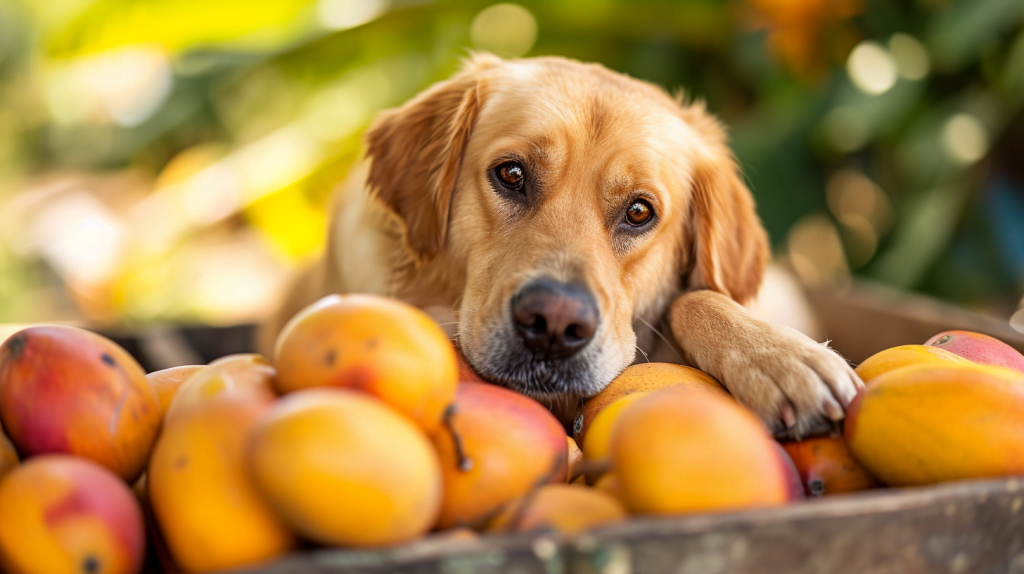It’s mango season, and as you savour the sweet, juicy flavours of this tropical fruit, your furry friend might be gazing up at you with those longing puppy dog eyes. This begs the question, “Can dogs eat mango?” and more specifically, “Is it safe for my dog to eat mango?” These are common concerns for dog owners, especially when you’re considering sharing your fruity snack with your canine companion.
Well, the good news is, not only is mango okay for dogs, but these fruits are also a healthy treat when prepared correctly. Yes, dogs can safely enjoy mangoes, as long as the fruit is peeled and the pit is removed. Mangoes are not only a safe choice for dogs but they also come packed with health benefits. However, as with any treat from our own plates, there are important guidelines to follow. Ensuring a safe and enjoyable mango experience for your pup involves understanding these key factors.
The Benefits of Mangoes for Your Dog
While mangoes are a delightful tropical indulgence for us, their value extends far beyond taste, especially when it comes to our dogs. Rich in nutrients and packed with flavour, these fruits are more than just a mere treat for dogs. Let’s uncover how they can contribute to your dog’s health and wellness, making them a great treat for your dog.
- Vitamins Galore: Mangoes are a fantastic source of vitamins. They’re rich in vitamins A, B6, C, and E, which are essential for maintaining healthy skin, coat, and immune system in dogs. Vitamin A, in particular, is vital for optimal eye health and vision.
- Fibre-Filled: With a good amount of dietary fiber, mangoes aid in digestion and help prevent constipation in dogs. A healthy digestive system is key to overall well-being.
- Antioxidant: These fruits are packed with antioxidants. Antioxidants play a crucial role in combating free radicals, reducing inflammation, and supporting overall health. This means mangoes can help keep your dog feeling spry and lively.
- Sweet Yet Safe: While many fruits have high sugar content that can be a concern, mangoes, when given in moderation, are a safe and sweet treat. They’re a great way to satisfy your dog’s sweet tooth without the adverse effects of processed sugar.
- Potassium Boost: Mangoes are a good source of potassium, which is essential for proper muscle and nerve function in dogs. This nutrient helps keep your dog’s heart healthy and ensures their muscles work efficiently.

How to Feed Mangoes to Your Dog
Mangoes can add a tropical twist to your dog’s snack time. But it’s essential to introduce this fruit in the right way. Let’s break it down into easy-to-follow sections.
Serving Suggestions for Mangoes
- Peel and Pit: Always remove the skin and the pit. The skin is tough to digest, and the pit is not only a choking hazard but also contains small amounts of cyanide.
- Fresh Over Processed: Offer your dog fresh mango. Canned mangoes and mango products often contain added sugars or preservatives that are not suitable for dogs.
- Dehydrated Mangoes: Dehydrated mangoes can be a convenient alternative, but ensure they are free from added sugars or preservatives. Also, because they are more concentrated in sugar, offer them in smaller quantities compared to fresh mango.
How Much Mango Can I Feed My Dog?
- Moderation is Crucial: Mangoes are high in sugar. A few small pieces for smaller dogs and a little more for larger breeds is sufficient. Treats should not exceed 10% of your dog’s daily food intake.
- Size Considerations: Adjust the portion size based on your dog’s size and overall diet. Start with a small amount and increase gradually, ensuring it suits their digestive system.
Can Mangoes Give My Dog an Upset Stomach?
- Potential for Digestive Issues: While mangoes are generally safe, any new food can potentially cause digestive issues, such as diarrhea or an upset stomach. Start with a small piece and watch for any signs of discomfort. If you notice any adverse reactions, reduce the amount or stop feeding them mangoes.
- Observe and Adjust: Every dog is unique. Keep an eye on your dog’s reaction and adjust accordingly. If your dog enjoys and handles mango well, you can continue to offer it as a treat.
- Veterinary Advice: If your dog has a sensitive stomach, allergies, or other health issues, consult with your vet before introducing mango or any new food into their diet.
Mangoes as a Dog-Friendly Treat
Can dogs eat mango? Yes, they can! After delving into how this tropical fruit can be a delightful treat for our furry friends, it’s clear that mangoes, when prepared properly, are both safe and beneficial. Rich in essential vitamins, antioxidants, and fibre, mangoes offer a nutritious boost to your dog’s diet.

However, the key to incorporating mangoes safely into your dog’s diet hinges on moderation and proper preparation. Always remember to peel the mango and remove the pit, introduce the fruit gradually to your pet, and stay vigilant for any signs of allergies or digestive issues. Whether opting for fresh or dehydrated mangoes (without added sugars or preservatives), it’s important to ensure these treats remain just a small part of your dog’s overall diet.
Every dog is unique, so observing how your dog reacts to mangoes is crucial. And, as always, when in doubt, especially for dogs with specific health issues or sensitive stomachs, seeking advice from your veterinarian is the best course of action.
So, the next time you enjoy a mango and notice your dog’s hopeful eyes, you can confidently share a small, safely prepared piece with them. Here’s to happy, healthy snacking for both you and your four-legged friend!







